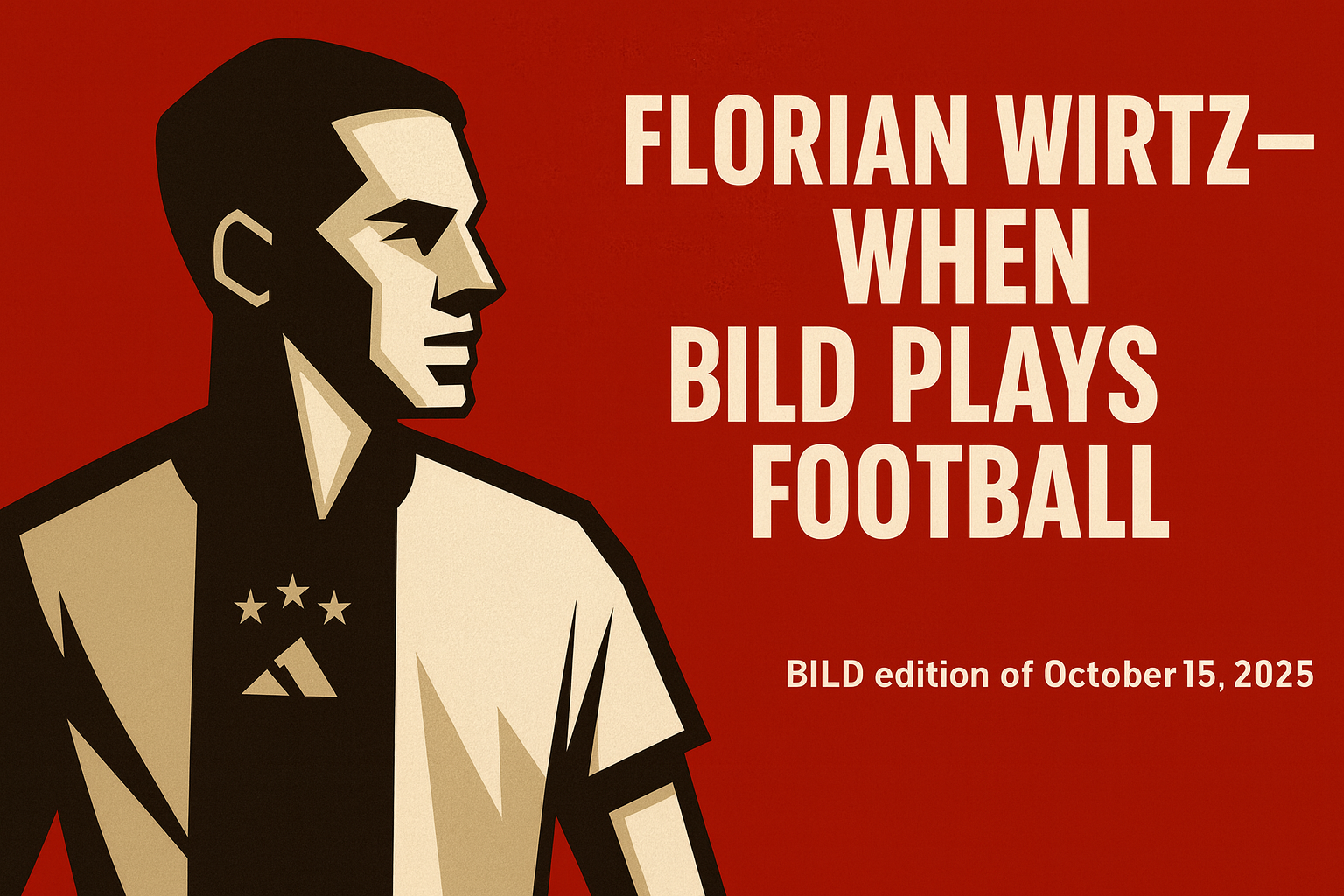Florian Wirtz – When BILD Plays Football

October 15, 2025
🟥 Florian Wirtz – When BILD Plays Football
(Why adaptation is not weakness, but intelligence in motion)
Pale, unlucky, tangled in his own dribbles.
That was the verdict of the BILD editorial team on Florian Wirtz after Germany’s World Cup qualifier against Northern Ireland —
a line that reads like something written back when statistics were still pub talk.
While editors apparently timed coffee breaks, Wirtz played 90 minutes of clean, structured, technical football:
36 of 39 passes found their target — over 92 percent accuracy.
He earned four fouls, completed three of six dribbles,
and with his phenomenal through-ball to Karim Adeyemi created Germany’s biggest chance — stopped only by a tactical foul just before the 2–0.
BILD didn’t mention it.
Nor did they mention the brilliant free kick against Luxembourg,
where precision and feeling met like compass and bull’s-eye.
These moments show that technique, instinct, and precision are not his problem — they are his trademark.
True, there were no goals, no assists.
But football is more than numbers on paper — and certainly more than a BILD grade of “4”.
A player who controls the ball with this calm and accuracy for 90 minutes while the opponent locks down space is not “pale”.
He plays intelligently.
And perhaps that’s the problem: intelligence on the pitch is only visible to those who understand the game —
and that’s where some headlines fall short.
⚙️ Facts, Not Phrases – Bundesliga vs Premier League
The Bundesliga and Premier League speak different languages — one counts touches, the other heartbeats.
| Metric | Bundesliga | Premier League | Interpretation |
|---|---|---|---|
| Fouls per match | 22–23 | 19–20 | Less whistle in England, game flows. |
| Ball-in-play time | 56.8 % | 56.5 % | Similar, but PL circulation faster. |
| Passes per minute of possession | 12.6 | 13.8 | Higher tempo in PL. |
| Shots per game | 27.4 | 22.8 | BL more direct; PL more selective. |
| PPDA (pressing intensity) | 11–13 | 9–10 | PL presses harder, higher. |
| Sprints / distance | ≈11 km | ≈10.8 km | Similar, but more high-speed bursts in PL. |
Germany values structure: tactical mechanics, repeatable patterns.
England thrives on chaos — controlled risk.
The Bundesliga is the laboratory; the Premier League the stress test.
And that’s exactly where Wirtz now has to operate.
⚽ From Leverkusen to Liverpool – a System Shock
In Leverkusen, Wirtz was the heart of a perfectly tuned machine:
a space interpreter who sees where the ball will be, not where it is.
Under Xabi Alonso he moved inside clear triangles —
every motion supported by structure, every run logically embedded.
In Liverpool, space itself behaves differently.
The game is faster, rougher, more chaotic.
The Premier League doesn’t measure precision — it measures survival speed.
Duels aren’t called; they’re won.
Time isn’t a concept — it’s a blink.
That a player like Wirtz at first plays “consciously” instead of in flow is not failure, but biology.
The brain needs repetition to automate patterns.
And that’s exactly what’s missing when everything changes: coach, system, teammates, language, media, energy, crowd, rhythm.
🔬 The Science of Adaptation
Elite performance is no accident. It emerges when body and subconscious move in sync.
Research from Cologne, Zurich and Stanford shows that when the environment changes,
the brain temporarily loses access to automated movement programs —
a process called re-contextualization of motor patterns.
The body still works — but the mind thinks too much.
And where thinking begins, flow ends.
Players like Messi, Mbappé or Haaland know this well:
new systems, new rhythms, new languages — and suddenly the body reacts a tenth of a second late.
Not because they forgot how to play, but because the brain is still learning to read the new world.
Sports psychology calls it energy redirection:
at first, energy flows into analysis and adaptation, not execution.
Only when confidence and security return does the subconscious regain control.
Then the game begins to flow again — by itself.
🌍 Adaptation Is Intelligence, Not Weakness
New environment. New people. New rhythm.
All of it changes how a player receives and releases energy.
The body reacts before it thinks — and when the environment shifts, so does that reaction.
Only once the brain stores the new as familiar does the energy flow return.
Adaptation isn’t a mental flaw; it’s a process of neural synchronization.
Wirtz is built for it. He’s not a player of force but of perception.
He reads spaces, not opponents.
He reacts to patterns, not coincidence.
Once his system resonates with its surroundings,
he won’t just succeed at Liverpool — he’ll redefine the German sense of the game there.
🧩 Why Even the Best Must Adapt
Lionel Messi – PSG (2021/22)
- Only 6 league goals — his lowest since 2006.
- Touches per game: 90 → 65 (–28 %).
- Pass accuracy > 90 %, but xG+xA dropped 30 %.
- Reason: less space, new role, shared hierarchy.
Second season: 16 goals, 16 assists — rhythm restored.
Kylian Mbappé – Real Madrid (2024/25)
- First 10 games: 3 goals, 0 assists.
- Final-third possession: 17 % → 11 %.
- New duties: deeper runs, defensive work, more off-ball movement.
- After tactical shift (Nov): 19 goals, 8 assists.
Even Mbappé needed roughly three months to align with the new energetic ecosystem.
🧭 Outlook
Florian Wirtz stands where all great players once stood:
in the space between habit and genius.
It’s the phase where the body works, the head thinks —
and the subconscious stays quiet.
But when that moment passes,
when thought becomes instinct again,
the game will flow through him.
And those who rate him a “4” today
will one day ask how they ever misread him so completely.
#FlorianWirtz #YouNr1 #IntelligenceInMotion #FootballMindset #Messi #Mbappé #Haaland #FlowState #NeuroscienceInSport




